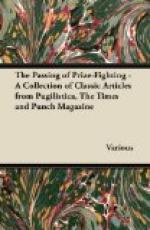With songs and swords and horses
They learned their careless
role,
While we are sent on courses
That starve the poet’s
soul.
With gay anticipations
They feasted ere a fight,
But we in calculations
Wear out the chilly night.
And if some hour of leisure
Permits a lyric mood
My wretched Muse takes pleasure
In nothing else but food.
Thus when I am returning
Ice-cold from some O.P.,
And in the East is burning
Aurora’s heraldry,
That spark she fails to waken
With which of yore I glowed,
Who, fain of eggs and bacon,
Tramp ravening down the road,
Aware, with self-despising,
Which interests me most—
The silvery mists a-rising
Or marmalade and toast.
Such are the War-bard’s passions—
Rank seedlings of a time
That chokes with maths and rations
The bursting buds of rhyme.
[1]: Field Artillery Training
* * * * *
A Romance of rations.
“Not like to like, but like
in difference.”
“The Princess.”
I have always misjudged Victorine—I admit it now with shame. While other girls have become engaged—and disengaged quite soon after—she has remained unattached and solitary. As I watched the disappointed suitors turn sadly away I put it down to pride and self-sufficiency, but I was wrong. I see now that she always had the situation well in hand.
As for Algernon, he is the sort of man who writes sonnets to lilies and butterflies and the rosy-fingered dawn—this last from hearsay as he really knows nothing about it. He is prematurely bald and suffers from the grossest form of astigmatism, and I thought that no woman would ever love him. I never dreamt that Victorine had even noticed he was there.
One day I heard that they were engaged. It was too hard for me to understand.
On the third morning I went to see her.
“Victorine,” I said, “you have never loved before?”
“Never,” she assented softly.
“Now, this man you have chosen—you do not care overmuch for lilies and butterflies and rosy-fingered dawns?”
“Not overmuch,” she admitted sadly.
“Then what is it brings you together? What strange link of the spirit has been forged between you? To speak quite plainly, what do you see in him?”
“Yesterday we lunched together, and two days before that he got here in time for breakfast.”
“And the engagement still holds?” I am no optimist.
“Before that we dined. Yes, I do not exaggerate. It was my suggestion. One sees so much unhappiness now-a-days, and I wished to be quite sure we were suited to one another.”
“And you are convinced of the sincerity of the attachment?”
“Why, I feel for him as Mother does for the knife-and-boot boy, and Uncle Stephen for the charlady. We cannot be separated. It would be monstrous.”




